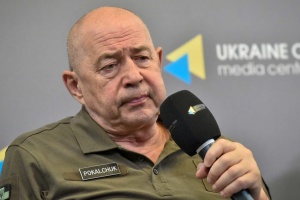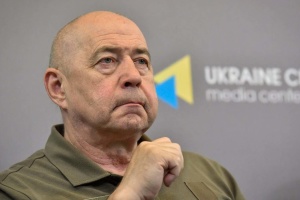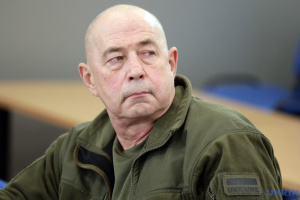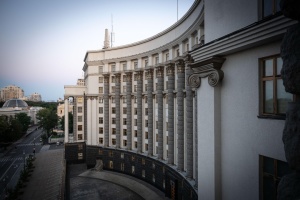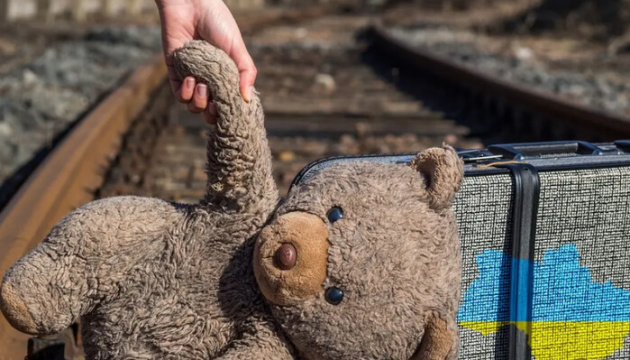
Russian Fascism Wants to Educate Ukrainian Children “to Defeat the Enemy”
In September 2023, the foundation of Russian totalitarianism will be supplemented. In all universities, both humanitarian and technical, in particular, in the temporarily occupied territories (TOT) of Ukraine, all young people will begin a new stage of educational life with a six-month study of a new “discipline” called Fundamentals of Russian Statehood. This course is relied upon as a “growth point” to strengthen the ideology throughout Russia through the education of young people.
The course will impart messianism to young people, inform about Russia as a separate civilization, with its own special path, different from Western democracies. For example, Kazan University considers the main goal of the course to be the formation of three main “competencies” with students: “identity of Russia,” “sovereignty of Russia,” “leadership of Russia.”
Ukrainian historian Serhii Hromenko notes that this course is an attempt to update Russia’s ideology: “Despite the constitutional ban on ideology in Russia, the whole of 2022 was devoted to its development. In form and positioning, the “Fundamentals” are similar to the “scientific communism” of the Soviet era, but in content they are closer to the imperial triad: “Orthodoxy, autocracy, nationality.” The emergence of a de facto mandatory ideology is one of the most important markers of Russia’s transition from personal authoritarianism to totalitarianism. The main goal of this process is to ensure the preservation of the modern Russian regime in the conditions “after Putin.”
In the imagination of ideologists, Russia is a separate state-civilization, whose main values are stability, mission, responsibility, and justice. The key characteristics that make it unique are its size, natural wealth, cultural diversity, economy, and successful past experiences. As in the days of the USSR, chauvinism and aggressive imperial policy are hidden behind pretentious slogans.
It is planned that 50,000 course teachers will be specially trained in the future. The first ones will begin to teach students, in particular, in the occupied territory of Ukraine, starting from September 1.
The Movement of the First or New Pioneers
Last year, Russia restored the “new pioneers.” In June 2022, Putin signed the law “On the Russian Movement of Children and Youth,” the abbreviated name is Movement of the First. Since 2023, branches of this organization have been opened en masse in schools both in Russia and in the temporarily occupied territories.
Here are a few examples of its operation. The Movement of the First, together with the Ministry of Education and Science of Russia, within the framework of the University Changes project, takes Ukrainian children from the occupied territories on ten-day tours to Russian universities. It is announced that this year, it will engage 14,000 children. In these trips, Ukrainian schoolchildren are mixed together with the children of Russian occupiers involved in the aggression against Ukraine, as well as “demobilized students” from the temporarily occupied territories of Luhansk and Donetsk oblasts.
Through the Movement of the First, a school kit will be presented to all first-graders on September 1 who go to the occupation school. It will include stuff with the emblems of the Movement of the First: a backpack, a diary, notebooks, and stationery, as well as the graphic novel Hero of the Special Military Operation.
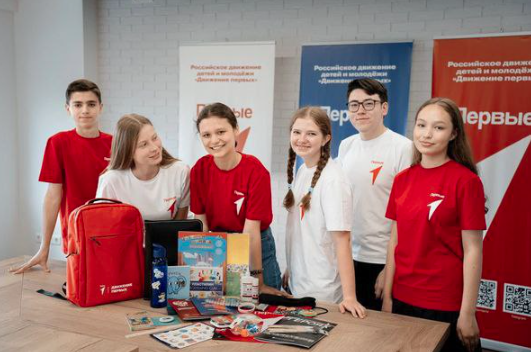
Illustration of the news story about “gifts” to Ukrainian schoolchildren from the Russian telegram channel.
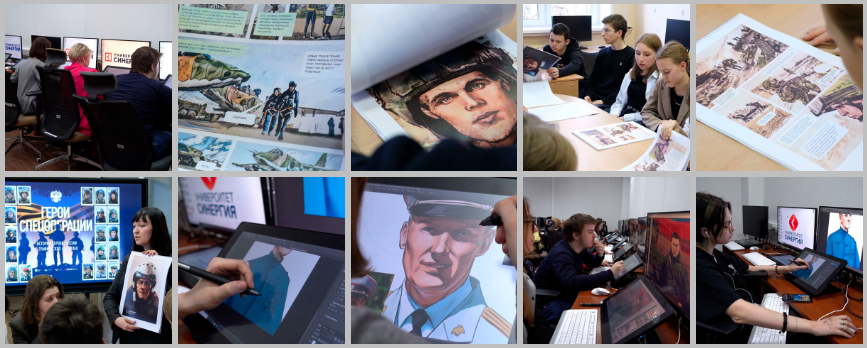
Creation of the graphic novels Hero of the Special Military Operation in the Russian corporation Synergy.
“Putler Youth”
The Movement of the First operates in parallel with the Young Army, a mass organization for the militarization of children. It was created in 2016, reportedly on the initiative of Russian Defence Minister Shoigu. Currently, it can reach about 1.3 mln children and adolescents. Due to its mass character, similar practices, and purpose, it is often compared to the Nazi Hitler Youth.
The centres of the Young Army are also established in the occupied territories, where Ukrainian children are ideologically educated to turn them into new soldiers of the empire. The so-called “heroes of Special Military Operation” come to schools, boasting of their “feats” and persuading to hate Ukraine.
The tutors of the Young Army, such as Seraphim Ivanov, who arrived in Kherson Oblast from Russia, fill the young people’s minds with lies and hatred: “Today, a special operation is taking place; this is a continuation of the holy war against fascism. Special military operation fighters, as well as their grandfathers and great-grandfathers. … The Kyiv regime does not care, they are ready to kill even children. … In Ukraine, many people suffer from alcoholism, drug addiction.”
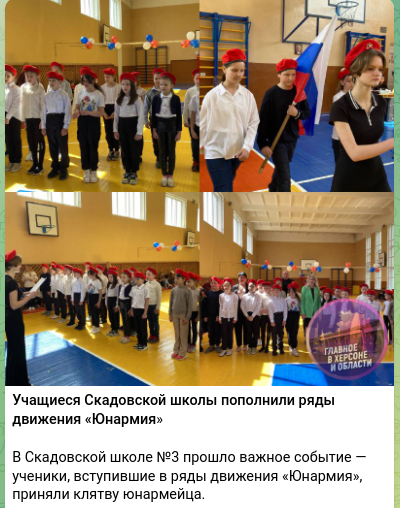
May 10 news story from one of the Russian Telegram channels.
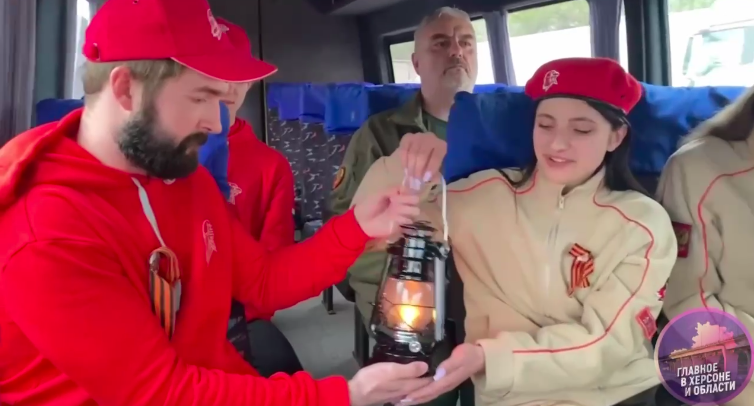
The members of the Young Army with their Russian tutor Seraphim Ivanov (left) carry the “eternal flame” from Moscow to the occupied part of Kherson Oblast.
The forced indoctrination and militarization of education in Russia was one of the consequences of the full-scale war with Ukraine. Inadequate assessment of reality by Putin’s regime, lack of understanding of Ukraine, led to the fact that his perverted geopolitical dreams of a special operation to destroy Ukrainian statehood resulted in the largest war in Europe since World War II.
The feature of this war is that the societies of Russia and Ukraine, through the knowledge of the Russian language by Ukrainians, as well as the tools of the Internet, have the opportunity to argue with each other.
Thus, the Kremlin regime understands that Russian youth can with time realize they are being deceived, that, for example, neither Ukraine nor the “collective West” would ever attack a nuclear state, and therefore the statement of a preventive attack for the sake of Russia’s security does not stand up to criticism. At the same time, the Russian youth lose from the fact that the elderly representatives of Putinism and the Kremlin stole their opportunities for normal international cooperation in education and business, dragged them into an invasive war, and infected with anti-Western and anti-Ukrainian hysteria.
Russia’s criminal attack on Ukraine gives sufficient grounds for analogies with Hitler’s aggression. The scale of atrocities, for example, the destruction of Mariupol by aerial bombs, accompanied by the killing of tens of thousands of civilians, has reached such a scale that the Kremlin regime has no choice but to use propaganda, fanaticism, and lies to try to shield society from reality.
The fact that Russia is focused on the indoctrination of children in the occupied territories is perfectly illustrated by the phrase of Deputy Head of the Presidential Administration of Russia Sergei Kiriyenko, who likes to repeat: “If you want to defeat the enemy, bring up its children.” This explains the activity with which ruscism rushed to “educate” Ukrainian children. “The phrase has become an axiom,” Olga Golishenkova, who is engaged in the introduction of the course, told Russian Vedomosti about the development of Fundamentals of Russian Statehood. According to her, this is the phrase Kiriyenko quoted many times during the development of the course.
Modern leaders of the regime should remember well how in the 1980s, on the eve of the collapse of the USSR, its citizens, and they themselves, mostly ridiculed the Soviet government, and did not believe in its propaganda mantras. Now they are returning to their totalitarian Soviet youth, but they believe that thanks to more thorough public work the result will be different.
For example, to introduce the course Fundamentals of Russian Statehood, as Vedomosti reported in the material for March 31, it is planned to create 121 thematic films and use “intellectual games and quizzes, work in project groups, immersive performances, debates, historical and business games. Workshops will be held, podcasts will be recorded, projects will be developed, for example, on the topic of ‘the image of the power structure’. Academic competitions and scientific conferences are also provided for students. In addition, lectures by politicians and statesmen are planned. Weekly student discussion clubs will be held.”
Buying part of the Ukrainian teachers with salaries on the temporarily occupied territories, and children with trips and prospects within youth projects, Russia turns Ukrainian young people in the occupied territory into its future soldiers who will replenish the ranks of the army that lost much of its contingent in the war. The results of the militarization of children in the occupied territories are visible by how easily the Russians mobilized students from the temporarily occupied territories of Donetsk and Luhansk oblasts. Thus, the information portal Sprotyv (Resistance), moderated by the Special Operations Forces, reported that despite Putin’s statement in December 2022 about the demobilization of students from these oblasts, at the end of March, a large number of them still fought in the Russian army.
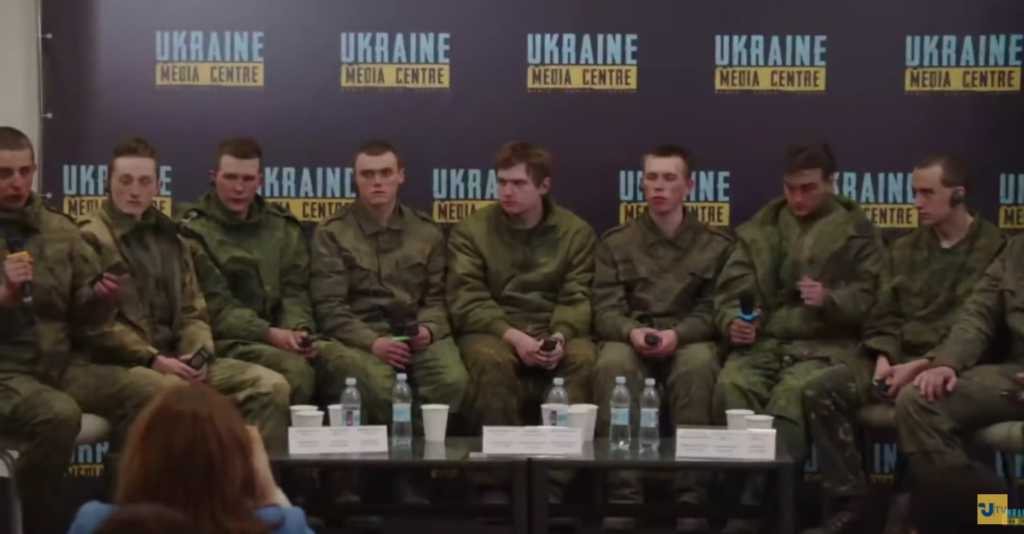
Press conference on March 31, 2022, of captured young people from Luhansk and Donetsk oblasts, whom Russia sent to fight against Ukraine.
Russia mobilized 3,515 students in Donetsk oblast, of whom 70 were killed, 174 were wounded, and 272 deserted. About 2,000 young men were still serving in the invader’s army in March 2023. In Luhansk Oblast, 654 students were mobilized, of which 5 were killed and 70 were injured. About 300 young men served in March. At the time of Russia’s hybrid aggression in 2014, these were Ukrainian children, who were then about ten years old.
The Center for Civic Education Almenda studied 59 open-source memorial plaques to the so-called “heroes of the Special Military Operation,” which the occupation authorities placed on the walls of educational institutions of the occupied Crimea, as well as the biographies of these soldiers. We are talking about Ukrainian citizens who lived on the peninsula before the war and did not come from Russia. Some of the plaques are dedicated to persons who were children during the occupation of Crimea in 2014 and were sent by the aggressor to fight against their own country.
According to the researchers, children who studied in Crimea in 2014-2022 were under the powerful ideological influence of Russian propaganda during their school years. Their death during the Russian-Ukrainian war is now becoming a new tool for the militarization of new generations in Crimea, who are urged to “follow the example” of their dead compatriots.
Memorial plaques on the walls of Crimean educational institutions are interpreted by researchers as direct evidence of the crimes of Russia against the children of the captured peninsula. After all, mobilization in the occupied territories in any form is a violation of Article 51 of the Geneva Convention.
We see how Russia first kills young people, and then makes an element of an almost religious cult out of this tragedy, in which it is forbidden to question the veracity of the myth of “heroes,” and on which new soldiers are raised for subsequent thoughtless wars.
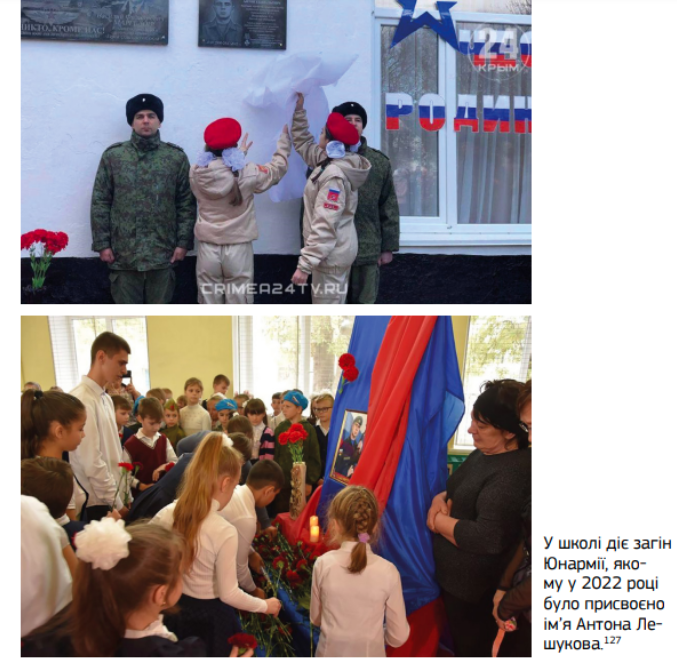
Screenshot from the study Memorial Plaques as Evidence of Russian Crimes in Crimea
“After the deoccupation of Crimea, Ukrainian society will face a rather difficult and painful question: how to treat citizens who participated in the war against their own people.… It is Russia that is responsible for the deaths of these young people in the Russian-Ukrainian war, and therefore their stories should be told not from the standpoint of heroization, but with the understanding that the policy of indoctrination and militarization of children and young people has deadly consequences, so that in the future there will be no repetition of such destructive practices,” the researchers conclude.
The insight into the scale of the involvement of Ukrainian children in the Russian military matrix is provided by Almenda’s monitoring of the actions of the occupiers in education called Alarm Bells of Occupied Education. Here are just a few examples for July 13 – July 26.
– The Russians took up to 80 high school students from the temporarily occupied territory of Luhansk Oblast to the military academy in Kostroma (Russia). Abducted children are now undergoing “military training” at the training ground of the Timoshenko NBC Protection Military Academy, located in Kostroma Oblast.
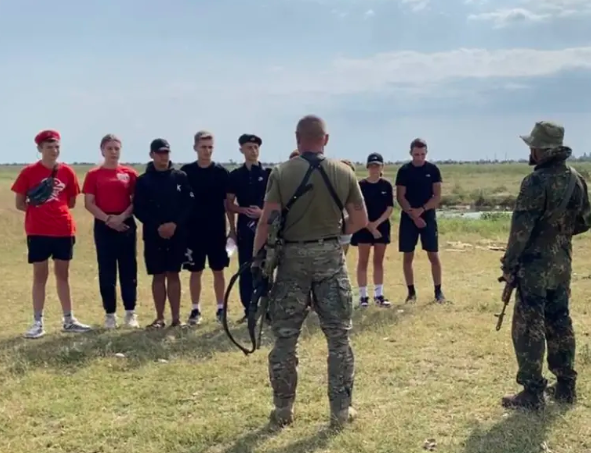
The occupiers are training Ukrainian children in Kherson Oblast.
Russia is introducing a system in which persons who fought against Ukraine take courses to work with children. This is what the Verstka newspaper wrote in April 2023: “Russian schools are massively attended by men who returned from the war. They conduct Lessons of Courage, tell schoolchildren about Ukrainian fascists, show videos from the front and have children put on military equipment. The Russian authorities plan to actively use servicemen for patriotic education — and even launched a special project Your Hero, where demobilized men are taught to work with children.”
Thus, in addition to the deportation of children, which is a sign of genocide, and because of which the International Criminal Court issued warrants for the arrest of Putin and the Commissioner for Children’s Rights Lvova-Belova on March 17, 2023, the aggressor country is also indoctrinating young people in the temporarily occupied territory of Ukraine, bringing curators from Russia and direct participants in the aggression.
The Center for Strategic Communication and Information Security asked Ukrainian educators to share their thoughts on what was happening in the occupied territories and how Ukraine should respond to the challenge.
Valentyna Potapova, Head of the Center for Civic Education Almenda
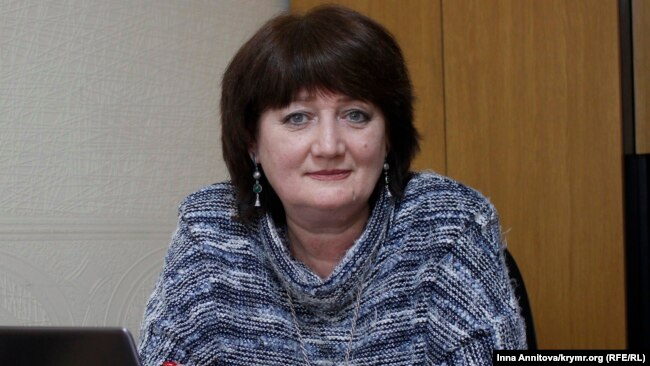
– Before the full-scale invasion, we felt that a plan of the so-called “denazification” was created in Russia, in fact, the Russification and reprogramming of children through the education system. What we have seen is an impressive speed in the introduction of the Russian education system.
The Ukrainian component was immediately eliminated. This covers the history of Ukraine, the geography of Ukraine, the Ukrainian language, literature, and legal studies. This is a humanitarian block that was eliminated almost immediately. Textbooks on the history of Ukraine were removed in Mariupol and Berdiansk when the battles for Mariupol were still going on. They were sent to Russia for “examination.” In August 2022, a large forum of teachers from Russia was held on the “falsification of history,” at which they came to the conclusion that textbooks on the history of Ukraine were “textbooks of Nazi history.” The whole history of Ukraine was included in the lists of Roskomnadzor as extremist literature. It turns out that the study of the history of Ukraine in the occupied territory falls under the “criminal liability,” according to the laws of Russia.
There were cases when children had their phones seized right during the lessons and looked at whether they had Ukrainian sites, social networks and checked whether the child was studying remotely at a Ukrainian school. This is something that did not happen in Crimea. The Crimean option is a gentler integration, compared to the occupied territories of 2022.
Children, as everywhere, are told that the purpose of the “operation” is to force Ukraine to peace. A whole system has been built to change the values of young people who are under occupation. This is a system of not only formal, but also non-formal education. It is aimed at all young people, starting with preschoolers. The first mechanism is indoctrination — engaging children in the doctrine, neglecting all the basics of common sense. The second is militarization. These are letters to soldiers, weekly political briefing “Conversations about the main things,” “Lessons of Courage” with the participation of the military. Adding to this are regular events we call “pobedobesie” (Victory Day frenzy) which begin on February 23 — Defender of the Fatherland Day — and end on June 12 — Russia Day. Militaristic activities are carried out — the Zarnitsa military and patriotic game. Russia allocates large funds for all this.
Since 2022, a special position — “advisor for educational work” — has been introduced in schools. Separate salaries are allocated for this position. The job of this advisor is to organize cooperation between the school and youth movements, in particular, the Young Army. These are, in fact, “school political instructors” who have been introduced into every school of Russia and in the occupied territory since 2022.
The Russians are influencing our children from different angles, and it seems to me that every year, the number of those children who will mentally resist will gradually decrease.
According to our organization, the international community should start defending the right of Ukrainian children to study remotely in Ukrainian schools. International humanitarian law says that Article 51 of the Fourth Geneva Convention requires the Occupying Power to maintain those social services, including education, that were before the occupation. We need to demand that Ukrainian children have the opportunity, at least, to choose which school to go to.
Conclusion: Russia is stealing our young people. In the occupied territories, there are about half a million children in Crimea alone; along with other temporarily occupied territories, there are about 1 million Ukrainian children who are under the influence of Russian propaganda through the education system. When propaganda is broadcast through the formal education system, one cannot escape it, refuse it, your children will be “showered” with all this propaganda.
My main recommendation to the state authorities of Ukraine is to make Ukrainian children who go to the occupation school “visible.” Just as Ukraine was able to make the children whom Russia deports “visible”: they were counted, a separate website was created, a bunch of organizations and state bodies are engaged in the return of these children. Why is it important to return them to Ukraine? To avoid re-education. Therefore, it looks very strange when almost all state bodies are silent about more than 1 million Ukrainian children who are under occupation! When we see this problem, its challenge, predict the consequences of such occupational “upbringing,” then we, civil society organizations, state bodies, the international community, will look together for ways to prevent this crime.
I can say that today, in Crimea, after 10 years of occupation, most children and young people believe in Russian propaganda — in the “fatherland,” the great Putin, and the greatness of Russia…
There is a special report of the UN Secretary-General called Children and Armed Conflict. It explores 6 violations against children during armed conflict. Namely: kidnapping, killing and maiming of children, attacks on schools, denial of humanitarian access, recruitment and use of children, sexual violence. We want another violation to be added — the use of the education system for the indoctrination and militarization of children. After all, we, for example, see, judging by Crimea, how the Russian education system forced some young Crimeans, who were 12 years old at the time of the occupation of the peninsula, to raise weapons against Ukraine.
Halyna Shylina, Deputy Head of the Department of Education of Melitopol City Council
Over the past six months, pressure on teachers and students has increased in educational institutions. The presence of symbols in educational institutions has also grown. There is pressure on all students to take Russian passports. There are cases when the occupiers come to the homes of teachers, demanding documents for housing and a Russian passport. If there is no Russian passport, housing documents are seized to force them to take the passport. Teachers who cooperate with the occupiers are paid good money. Russia spares no expense in taking our children.
Our children from the 8th grade and those older are already involved in their, I would say, propaganda games. The Russians have formed many youth organizations, movements such as Young South, Movement of the First, and others. They all created Telegram channels. They organize trips around the region with campaigning. They used to engage children from the age of 16, now — starting from 12–13. As a result, the Russians are gradually drawing all Ukrainian children into campaigning for Russia. They distort facts. They teach children that Ukraine was the first to attack. Children are lied to, they are zombified. Huge posters with slogans in favour of Russia are hung on schools, the school corridors have posters with qr-codes with propaganda. Children often wear the same T-shirts that they were given, with phrases like “For Russia!”; they wear ties.
Young people are tempted by trips to camps. The occupiers also turn to the ambition of children, stating that their role is outstanding, and they can change everything. In addition to schools, kindergartens are also involved. Naturally, we feel sorry for the children.
Ukrainian literature is burned, destroyed, thrown away. The children showed some moral resistance to the invaders. But this struggle is very difficult for our children and their parents in the occupation. The pressure increases. Although they believe in Ukraine, they do not express their protest so openly. Some adults stop believing that Ukraine will return. After all, “Russia is here forever” is heard everywhere. But still, I see that people are waiting for the Ukrainian army and the liberation because no one can get used to the lines and stress that the occupiers brought. I would like to help them so that they believe and don’t lose hope of returning to Ukraine.
Currently, there is an offensive underway, and it is better to leave for the safety of children. There are many opportunities to settle, there are many modular towns in the West of Ukraine, one can settle and then look for a job. There are programmes to support IDPs in Ukraine and abroad. In general, education, especially in relation to the temporarily occupied territories, needs good funding. Because the teachers who left have to pay rent for the housing. Perhaps there should be a fund for such people to get them out of the occupation. Russia bribes and lures them with money.
Mykola Trofymenko, Rector of Mariupol State University

– As far as the seized premises of Mariupol State University are concerned, the occupiers are trying to show that it operates. They “registered” it as federal property. It is impossible to say how many students and teachers there are. The person who is now acting rector there, she worked with me, we dismissed her from the University for incompetence. What is happening there now is built on corruption schemes. Contracts are attracted from Russian so-called twin cities, funds and materials are embezzled. In fact, all the buildings have been destroyed. But they show that they are starting to repair them. There is no roof, heating in the buildings, but the invaders replace… windows. Everything is aimed at showing that the occupiers are restoring universities so that young people enter them and keep living in the occupied territories. This is the main task for them.
Our sports complex survived the attacks, and the first thing they did was paint it in the colour of the Russian flag to hold mass propaganda events there. Teachers who decided to cooperate with the occupier attend some professional development courses. But all these people, and we are closely monitoring this, will be punished in accordance with the current legislation. We actively cooperate with law enforcement agencies. All of them fall under Article 111-1 of the Criminal Code — implementing the education standards of the aggressor state.
Our Mariupol University, which has now moved to Kyiv, has retained 90% of both its students and its employees. But about a dozen of not the best employees stayed to work for the occupiers. Now they have a melting pot of different schools, other universities, vocational education institutions — everyone they managed to involve in order to form the staff. They say that they are actively developing cooperation with Russian institutions. They organize trips for exemplary students to St. Petersburg. Young people are misled by the promises of international prospects because, for example, cooperation with Europe is closed to Russia. Instead, students of Mariupol State University go to mobility programmes in all EU countries, participate in the Erasmus exchange programme.
We were shocked by Russian approaches to education — Young Army, full militarization. The occupiers attempt to influence the student movement to brainwash the youth and educate zombified people; that is who the average citizen of Russia is. This is extremely noticeable. Because we’ve always had academic freedom. Students were a great force that influenced management as well. They could express their opinion openly, disagree with something. Students are turned into zombified citizens of Russia, without critical thinking, who are easy to manipulate. For higher education and for the country, it is a tragedy when citizens cannot think. They are easier for the authorities to manipulate.
There are about 100,000 people left in Mariupol, plus migrant workers. About 200,000 left, 100,000 died as a result of the Russian attack.
They turned Mariupol into a cemetery. I myself was in the city under shelling until mid-March. And then when people started to crawl out of the basements, there was no food, no light. However, the first thing the Russians did, which says a lot about them, was that they brought cars with screens for propaganda on the ruins they caused. This is pure nonsense. I really want to believe that our young people are critical of all the nonsense that the occupiers are trying to spread.
We have incorporated it into the strategy and are actively working to preserve the Mariupol identity at the university. I believe that such relocated Universities as ours are one of those links that connect Ukraine with our citizens in the occupied territories. Here we need developed state support in order not to lose this connection so that it is possible to provide young people who remained in the temporarily occupied territories with state-funded places in educational institutions of Ukraine, invite parents, friends, remaining connections through relocated universities.
It is important to extract young people from the occupied territories. This is, in fact, the greatest value of the state. Not even the territory, but the people, for whom this struggle is ultimately being waged, for their hearts and minds.
This requires state-funded places, dormitories, to accommodate and help young people. Because the tragedy of Mariupol is so significant that it is not easy to overcome it for those who survived it. I can even see it in our team. But when people see the unity, that there is a single team, like a family, that solves all problematic issues, tries to promote and develop the University, it inspires them. I wish that we could also attract young people from the temporarily occupied territories and take them to our academic family and try to bring them to a normal state so that they forget about those horrors, overcome them, and continue to live a normal life, are provided with education, start families, give birth to children, find jobs and help rebuild Ukraine. I believe we will rebuild Mariupol as well.
Center for Strategic Communication and Information Security

